Adapted from my favorite chocolate cake recipe, this rich Guinness chocolate cake is made with reduced dark stout beer for deep flavor. Topped with ultra creamy chocolate Guinness cream cheese frosting, this cake might just become a new St. Patrick’s Day dessert tradition.
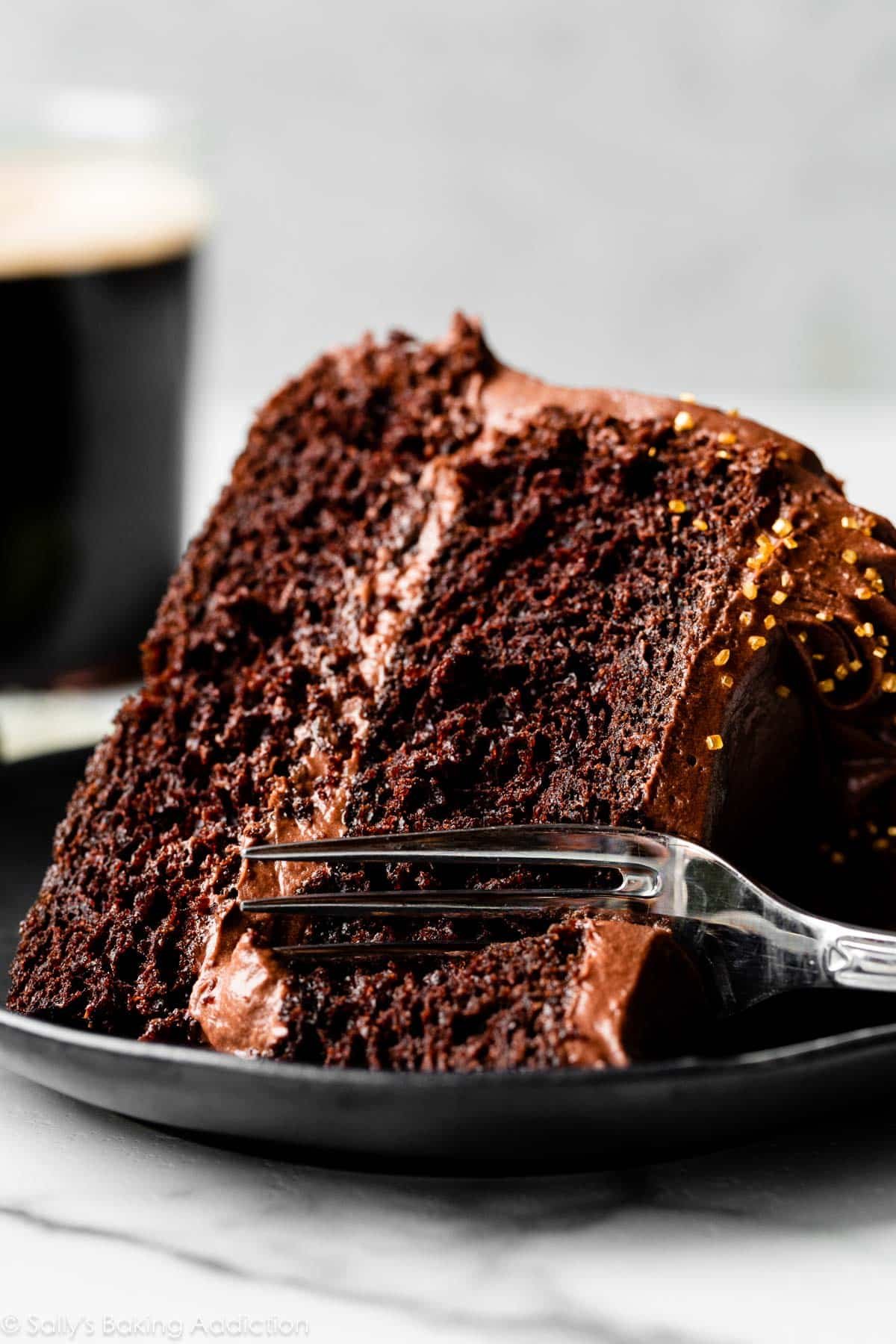
I’m not making this up: while I was photographing today’s cake, a rainbow actually appeared in my yard—not in the sky, in front of the trees in my actual YARD. I knew it was good luck; this cake was DELICIOUS.
And fortunately, you don’t need to find the end of the rainbow to make this chocolate Guinness cake. You just need 2 Guinness stout beers, and some basic baking ingredients.
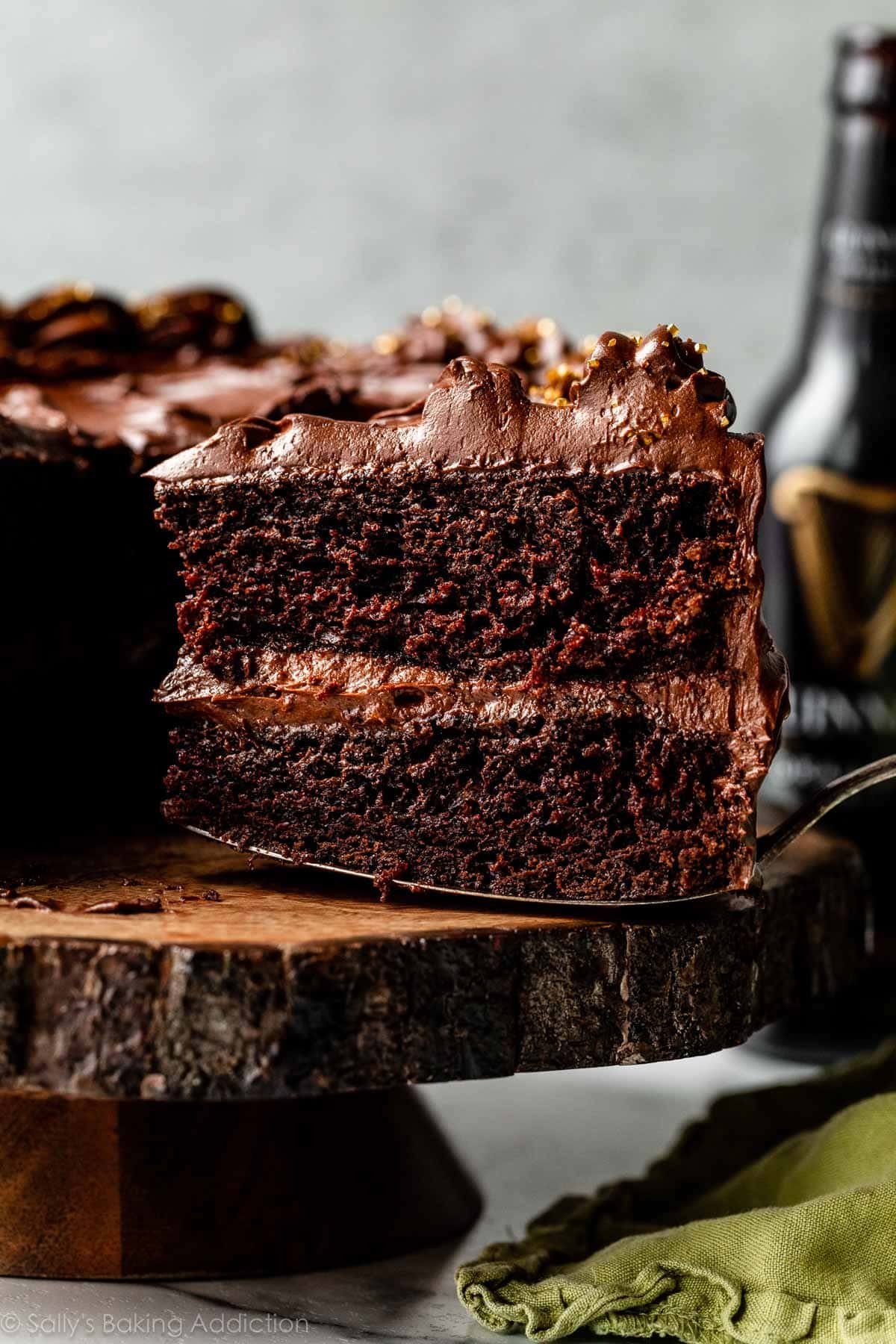
Why Bake With Guinness?
You don’t have to like beer to love this cake. Dark, smooth, and creamy, with roast coffee and caramel undertones, Guinness stout is often used in baking and almost always paired with chocolate. The two work well together because Guinness, like coffee, intensifies chocolate’s natural flavor. Desserts like Guinness cupcakes and Guinness brownies don’t taste like beer, just a more complex chocolate with a malty background.
We’re also incorporating the Guinness flavor in the chocolate cream cheese frosting, which is sweet and silky and complements the dark, fudgy chocolate cake perfectly.
So, to review:
Why You’ll Love It
- Chocolate cake is rich, moist, and fudgy, with a hint of Guinness flavor
- Malty undertones with notes of caramel and coffee
- Extra creamy, silky chocolate cream cheese frosting also incorporates the reduced Guinness concentrate for another kiss of flavor
But, this is baking. And, as I often say, baking is a science. You can’t just pour a couple of beers into cake batter. So how can we pack real Guinness flavor into chocolate cake and frosting, without turning everything into soup? The trick is to reduce the beer on the stove first, to concentrate the flavor into a small amount of liquid.
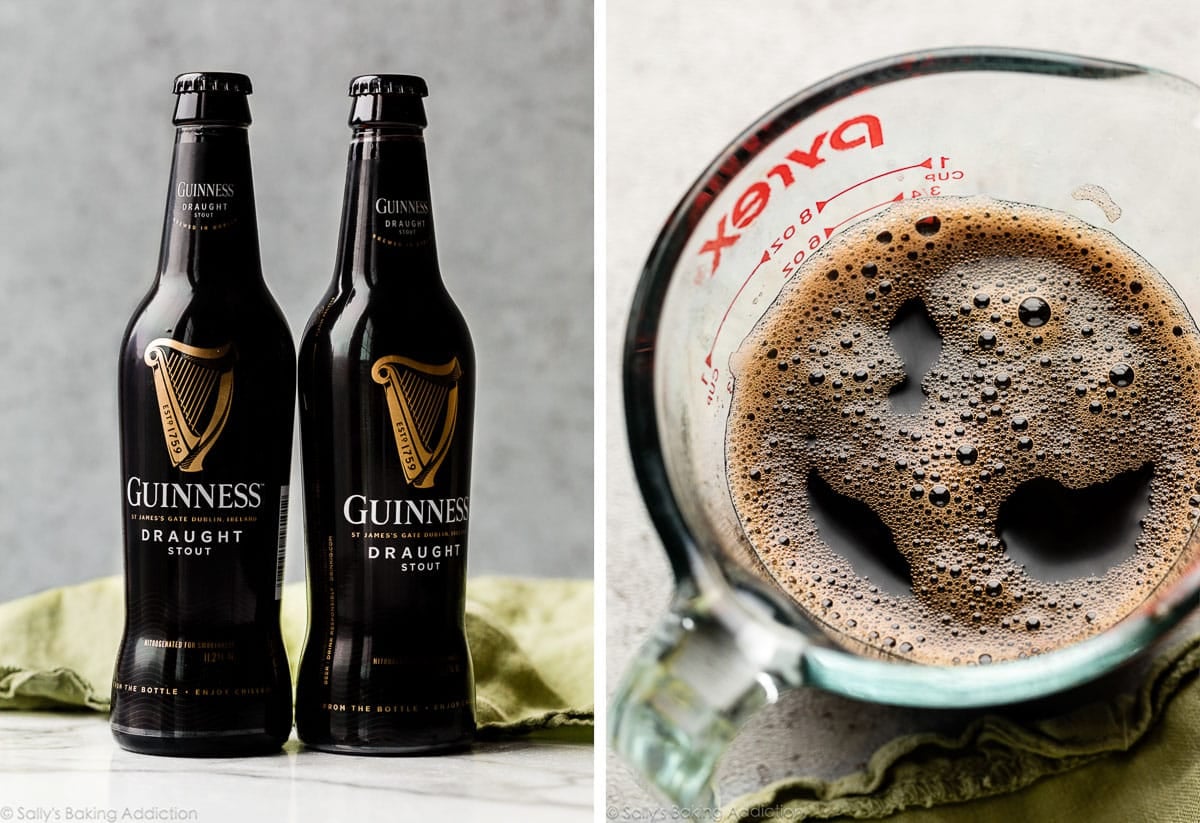
Best Way to Make Guinness Chocolate Cake: Reduce the Beer
The heat evaporates the liquid (and cooks off the alcohol), but leaves the flavor. We also do this with champagne in my mimosa cupcakes and champagne frosting. And with strawberries in my strawberry cake, too.
This step is really easy. Pour 2 bottles of Guinness stout into a large saucepan. Let it come up to just boiling—keep a close eye on it, because it will foam up a lot at first—then turn down the heat and leave it to simmer for about 30 minutes, until it’s reduced to just about 3/4 cup (180ml). You’ll be left with less liquid, but more flavor.
Will your kitchen smell like a brewery? Yes. Will the smell of baking chocolate cake quickly overpower it? Also yes.
- Success tip: Use a larger saucepan/pot than you think you need, with high sides. When the beer starts boiling, it will get very foamy and threaten to boil over. Reduce the heat to low; then, as the foam settles back down, slowly increase heat to medium.
Once the Guinness is simmering away, start mixing together the rest of the cake ingredients.
Other Ingredients in Guinness Chocolate Cake
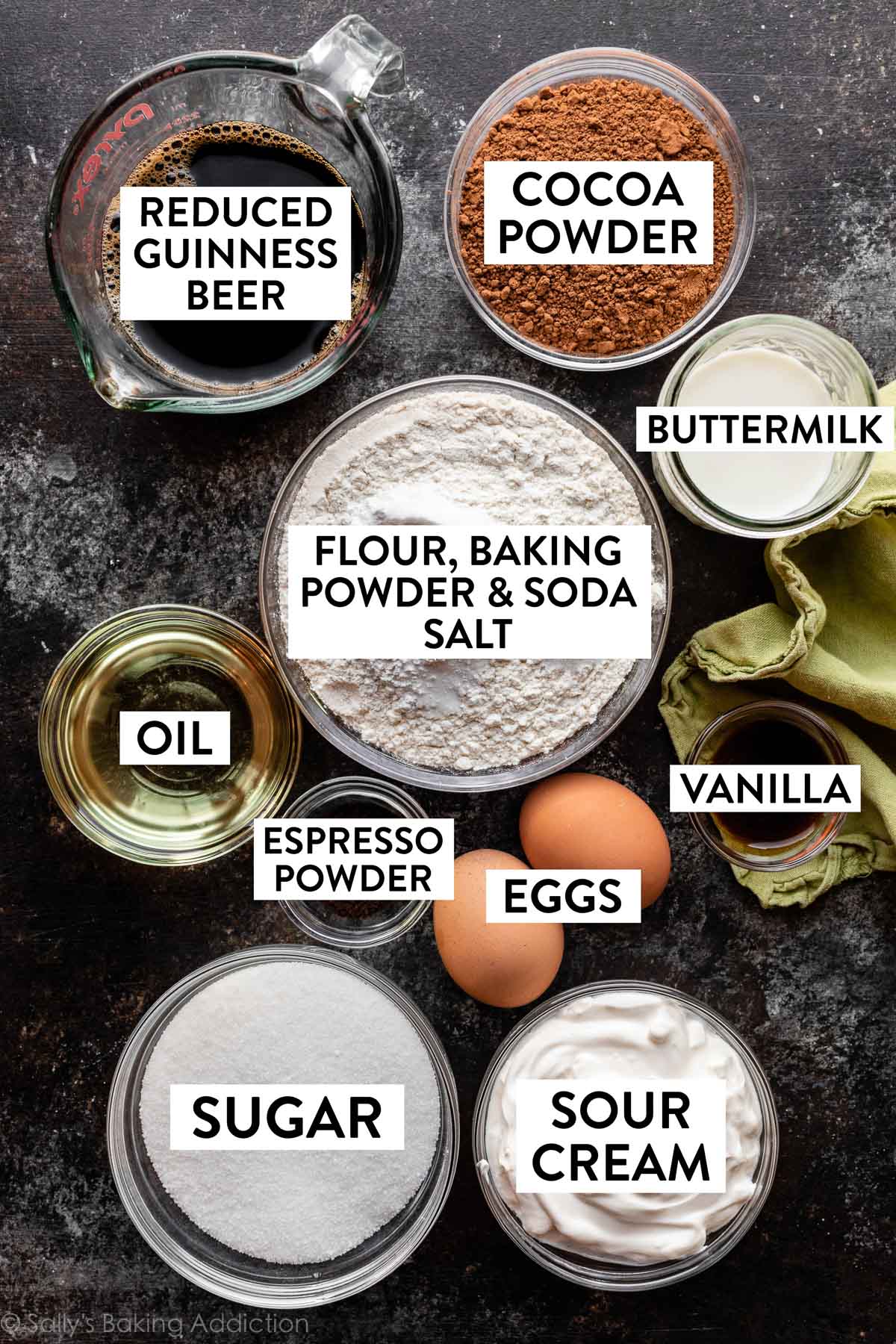
Let’s quickly review the other ingredients you’ll be mixing with the reduced Guinness, and why each is crucial to your results:
- All-Purpose Flour: The structural base of this recipe. Cake flour is great for vanilla cake; but when combined with ultra-light cocoa powder, it’s too fine for this cake. Stick to all-purpose here.
- Unsweetened Natural Cocoa Powder: Do not use dutch-process cocoa powder. If you’re interested, see dutch-process vs natural cocoa powder for an in-depth explanation.
- Granulated Sugar: Sweetens this cake.
- Baking Soda + Baking Powder: This is a fairly dense cake, but these 2 leavening agents provide the lift.
- Espresso Powder: Espresso powder accentuates the chocolate and Guinness flavors.
- Salt & Vanilla Extract: Flavor and more flavor!
- Vegetable Oil: Cocoa powder is a particularly drying ingredient, so oil is needed to ensure the cake is moist.
- Eggs: Eggs add structure and bind the ingredients together.
- Sour Cream + Buttermilk: While you could use just one or the other, you’ll have the best success with a combination of both, which makes for a moist and soft yet sturdy crumb.
Whisk together the dry ingredients, whisk together the wet ingredients, then pour the wet mixture into dry and whisk to combine. The last step for the cake batter is to add in the hot reduced Guinness. We’ll use 1/2 cup (120ml) of hot reduced Guinness in the cake batter, and set aside the remaining to cool completely for the frosting.
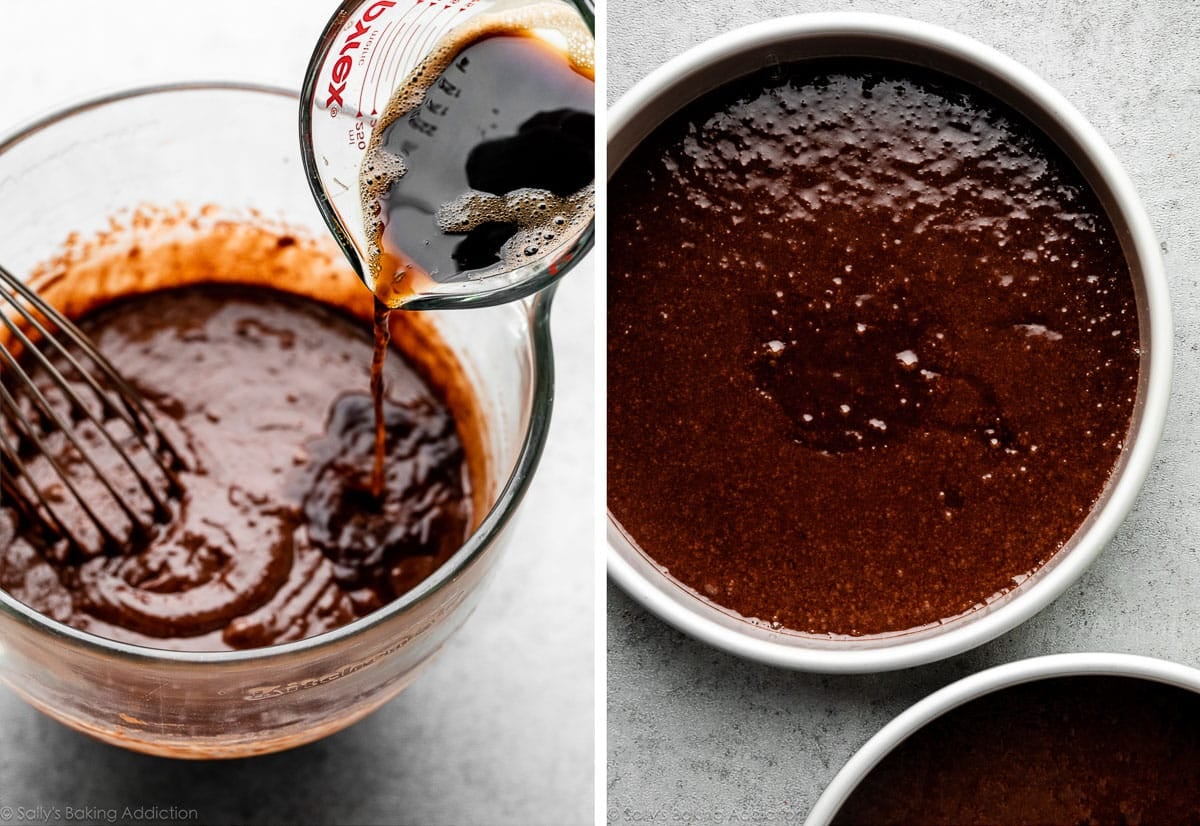
Why use hot liquid? Hot liquid helps the cocoa powder “bloom,” drawing out its rich flavor. We use hot coffee in this chocolate cake and these cream-filled cupcakes, but today we’re using reduced Guinness instead.
Chocolate Guinness Cream Cheese Frosting
I started with this recipe for smooth and silky chocolate cream cheese frosting, and simply swapped cooled Guinness concentrate for the heavy cream. That’s it—my team and I didn’t test anything further because this Guinness-hinted frosting was creamy, tangy, chocolatey, and PERFECT.
I also decorate the cake with gold shimmer sprinkles, the same I use on these St. Patrick’s Day cookies. Totally optional.
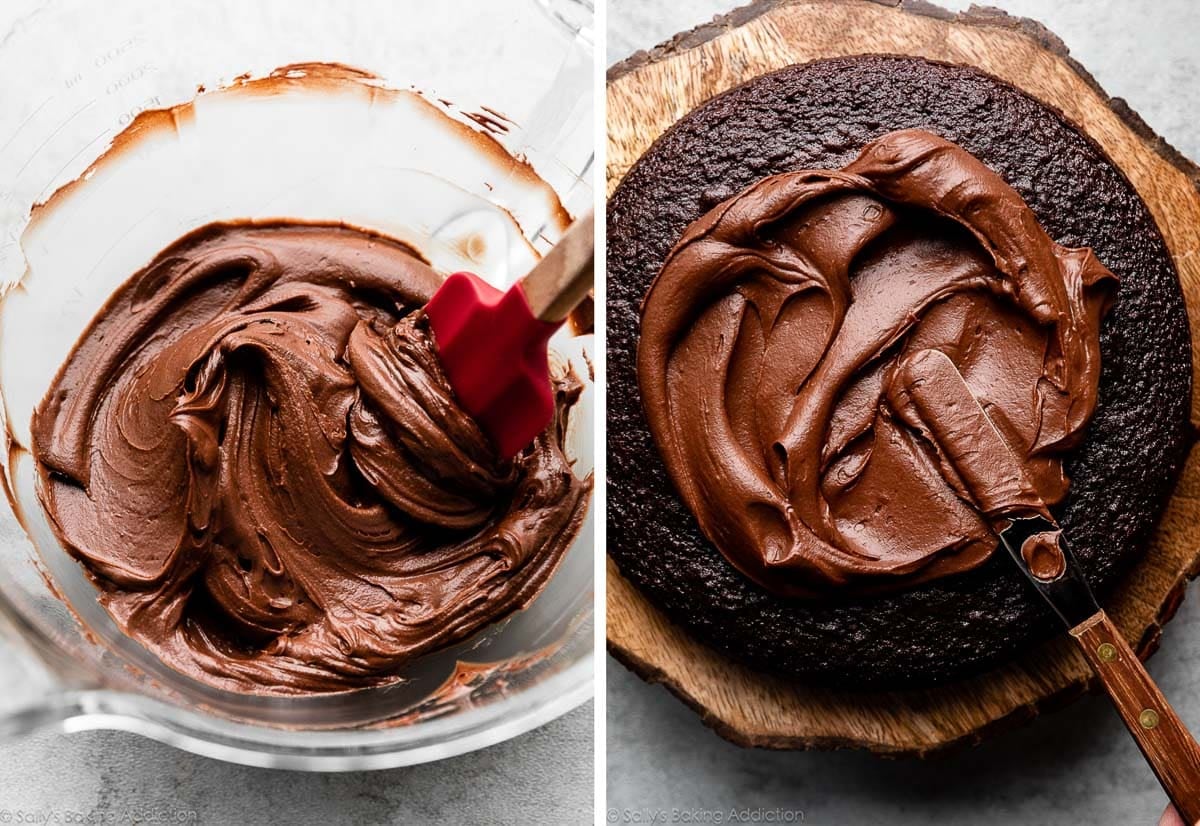
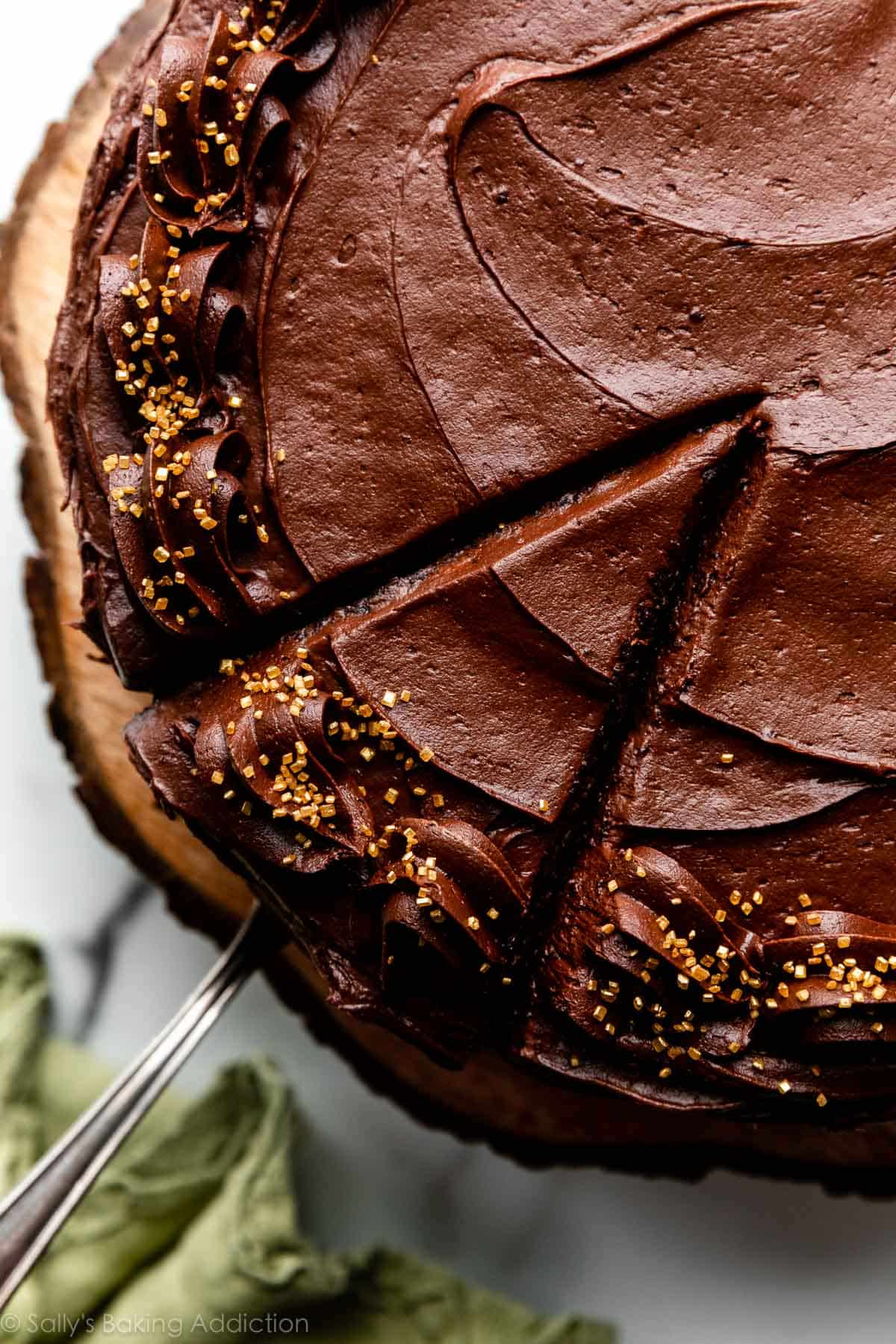
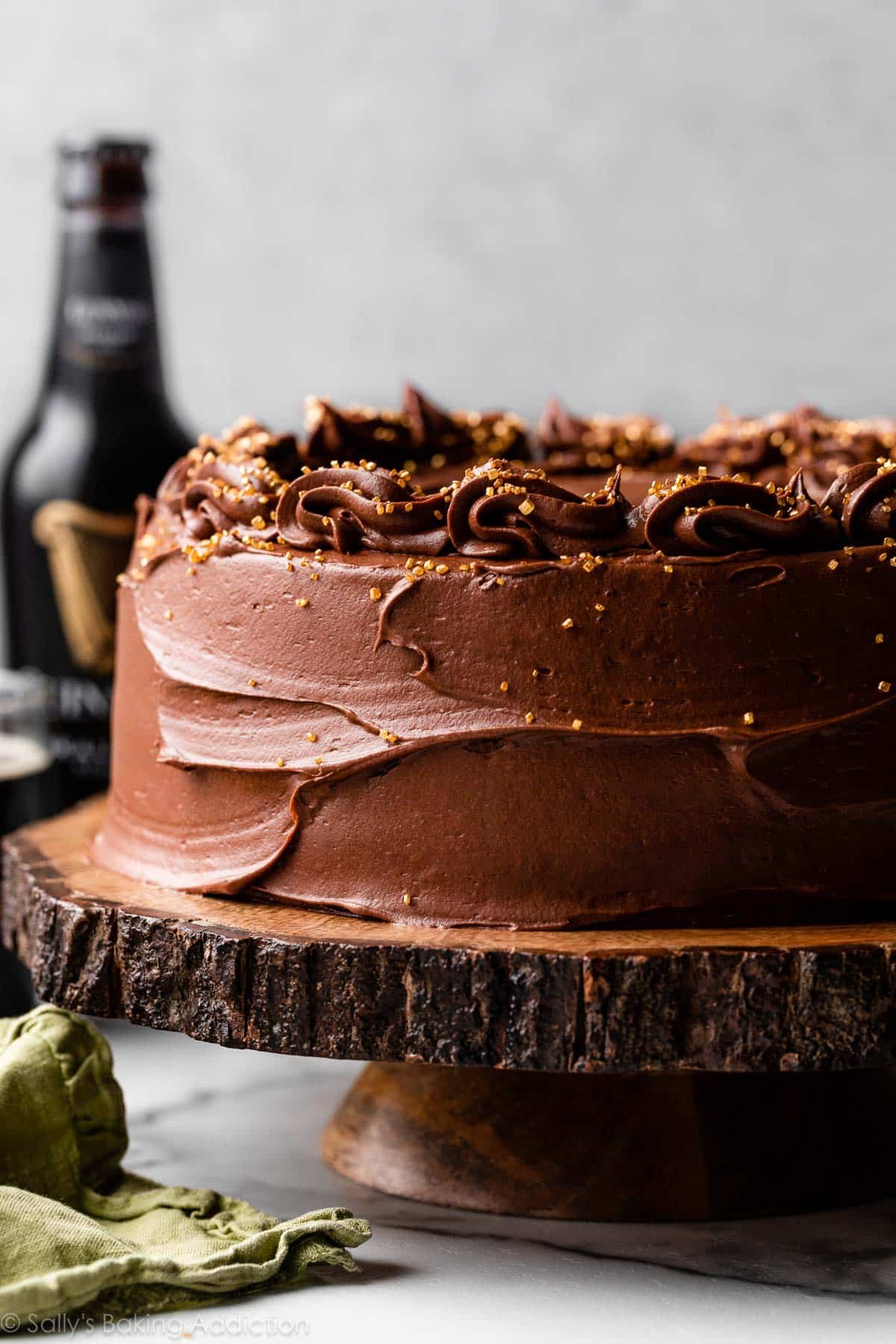
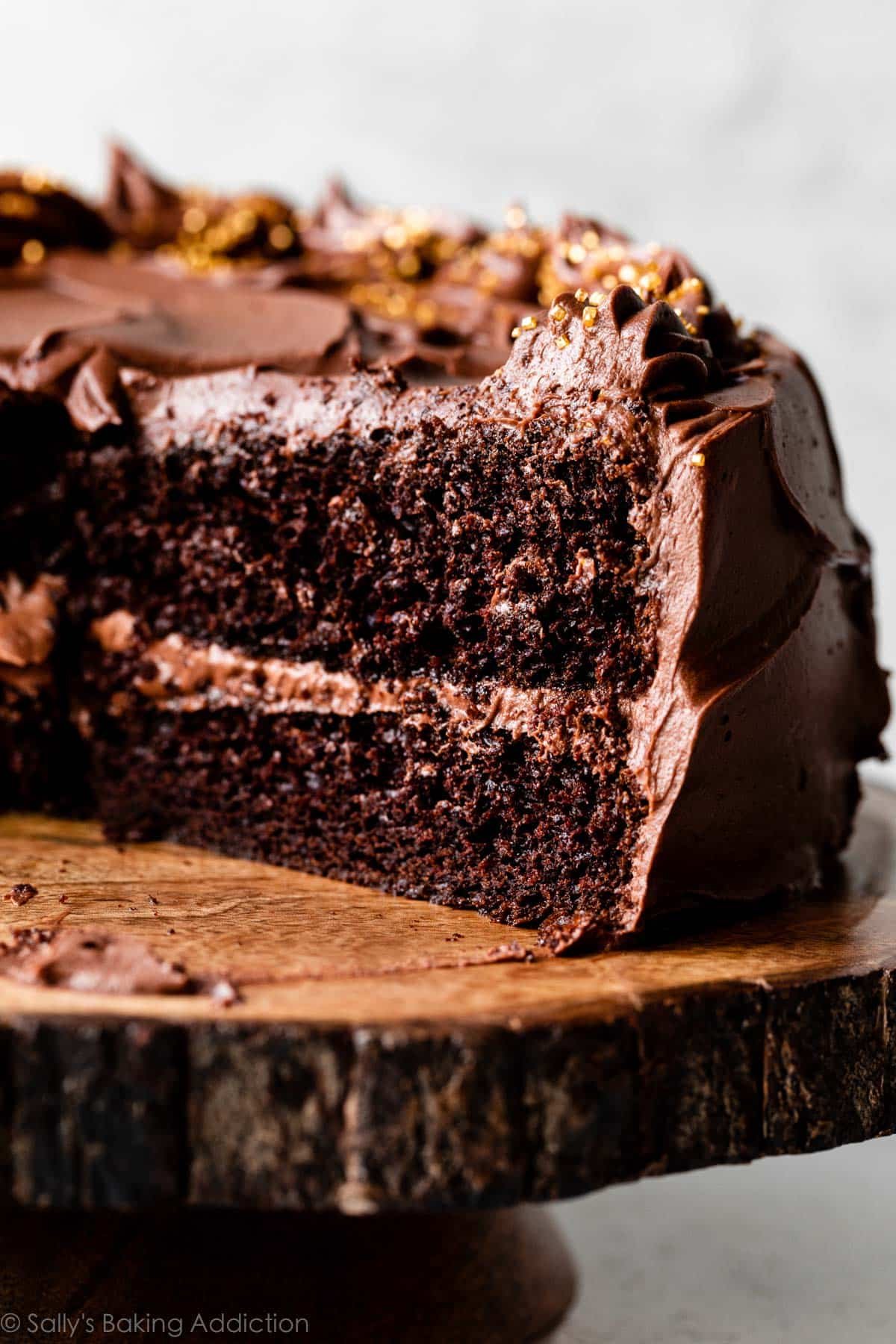
Draught vs. Extra Stout—Which Type of Guinness to Use
Guinness Draught is richer and creamier, because it’s carbonated with nitrogen. It has an ABV of 4.2%. Extra Stout is a little sharper and crisper, because it’s carbonated with carbon dioxide like most beers. ABV is a bit higher, at 5.6%. Either one works in this recipe.
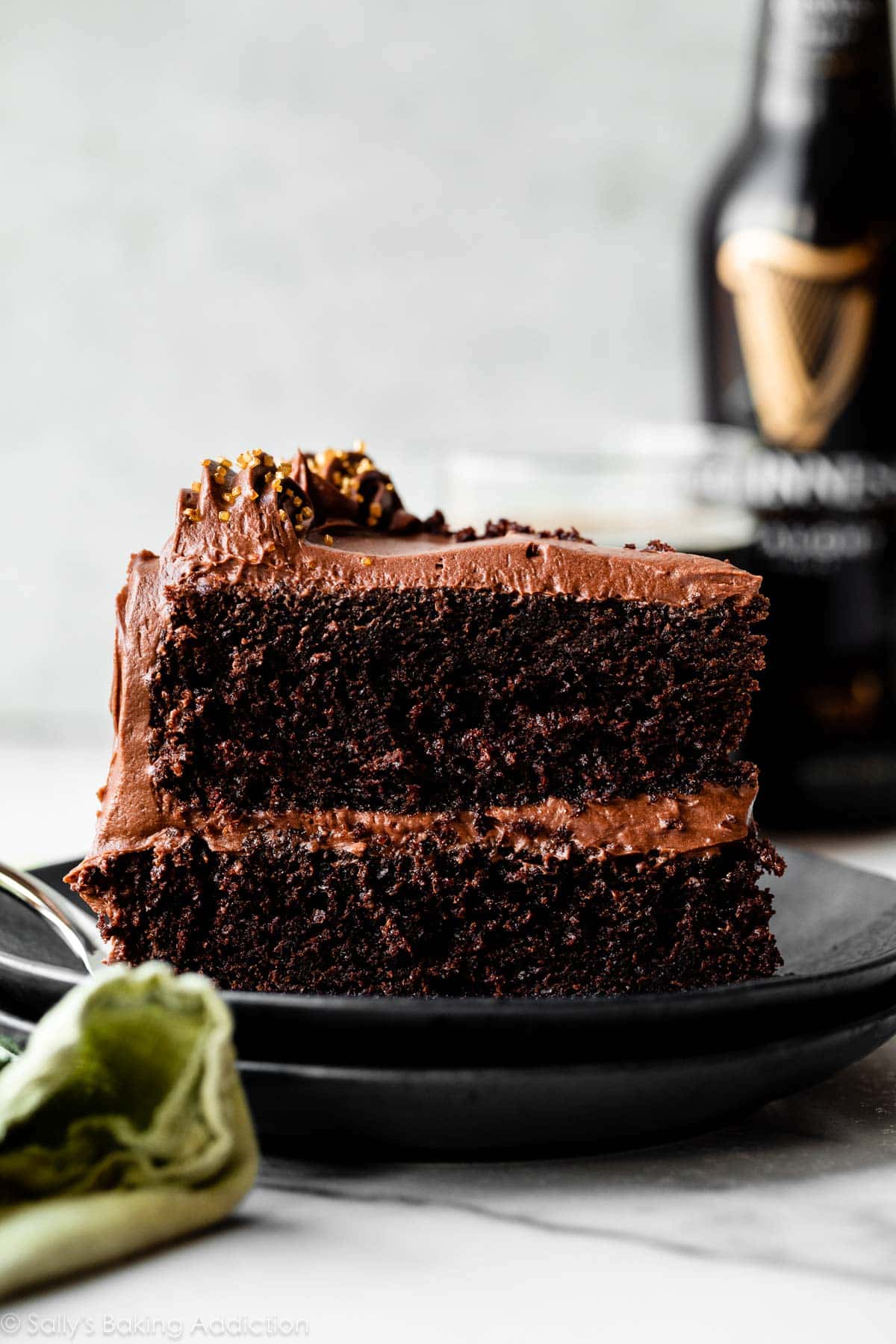
St. Patrick’s Day Treats
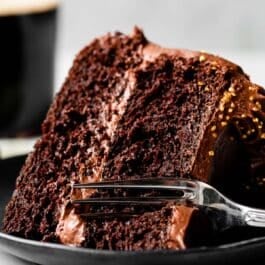
Guinness Chocolate Cake
- Prep Time: 1 hour
- Cook Time: 27 minutes
- Total Time: 5 hours (includes chilling)
- Yield: serves 12-16
- Category: Dessert
- Method: Baking
- Cuisine: American
Description
The BEST way to impart real Guinness flavor into chocolate cake is to reduce it down on the stove first. This packs in flavor without altering the cake’s texture. You can also prepare this chocolate layer cake as a sheet cake. See recipe Note.
Ingredients
Cake
- two 11.2–12-ounce (330–355ml) bottles of Guinness beer
- 1 and 3/4 cups (219g) all-purpose flour (spooned & leveled)
- 3/4 cup (62g) unsweetened natural cocoa powder
- 1 and 3/4 cups (350g) granulated sugar
- 2 teaspoons baking soda
- 1 teaspoon baking powder
- 1 teaspoon salt
- 2 teaspoons espresso powder (optional)
- 1/2 cup (120ml) vegetable oil (or canola oil or melted coconut oil)
- 3/4 cup (180g) full-fat sour cream, at room temperature
- 2 large eggs, at room temperature
- 2 teaspoons pure vanilla extract
- 1/2 cup (120ml) buttermilk*, at room temperature
Frosting
- 8 ounces (226g) full-fat brick cream cheese, softened to room temperature*
- 1/2 cup (8 Tbsp; 113g) unsalted butter, softened to room temperature
- 2 and 1/2 cups (300g) confectioners’ sugar
- 1/2 cup (41g) unsweetened natural or dutch-process cocoa powder
- 3 Tablespoons (45ml) reduced Guinness, from step 1
- pinch salt
- optional: gold sprinkles for garnish
Instructions
- Reduce the Guinness: In a large saucepan, bring the Guinness to a boil over medium-high heat. Once boiling, reduce to medium-low heat and allow to simmer until reduced down to about 3/4 cup, about 30 minutes. Begin making the cake batter once the Guinness is simmering. You’ll use 1/2 cup of the hot reduced Guinness in the cake batter, and set aside the rest to cool for the frosting. You can do this step 1 day ahead of time if needed—see Note.
- Preheat oven to 350°F (177°C). Grease two 9-inch cake pans, line with parchment paper rounds, then grease the parchment paper. Parchment paper helps the cakes seamlessly release from the pans. (If it’s helpful, see this parchment paper rounds for cakes video & post.)
- Make the cake: While the Guinness is simmering, whisk the flour, cocoa powder, sugar, baking soda, baking powder, salt, and espresso powder (if using) together in a large bowl. Set aside.
- Using a handheld or stand mixer fitted with a whisk attachment (or you can use a whisk) mix the oil, sour cream, eggs, and vanilla together on medium-high speed until combined. Add the buttermilk and mix until combined. Pour the wet ingredients into the dry ingredients, give it a quick mix/whisk, then add 1/2 cup (120ml) of hot reduced Guinness. Mix or whisk on low speed until the batter is completely combined. Batter is thin. If it helps, you should have about 6 cups or 1250g of cake batter total.
- Divide batter evenly between pans. Bake for 25–28 minutes or until a toothpick inserted in the center comes out clean. Baking times vary, so keep an eye on yours. The cakes are done when a toothpick inserted in the center comes out clean. (Note: Even if they’re completely done, the cooled cakes may slightly sink in the center. Cocoa powder is simply not as structurally strong as all-purpose flour and can’t hold up to all the moisture necessary to make a moist chocolate cake. It’s normal!)
- Remove the cakes from the oven and set on a wire rack. Allow to cool completely in the pans.
- Make the frosting: With a handheld or stand mixer fitted with a paddle attachment, beat the cream cheese and butter together on medium speed until creamy and smooth, about 2 minutes. Add confectioners’ sugar, cocoa powder, 3 Tablespoons (45ml) cooled reduced Guinness, and a pinch of salt. Beat on low speed for 30 seconds, then increase to high speed and beat for 1 full minute. Do not over-whip. Add a couple more Tablespoons of confectioners’ sugar or cocoa powder if frosting is too thin, or 1 more Tablespoon of cooled reduced Guinness if frosting is too thick. Taste. Add another pinch of salt if desired.
- Assemble and frost: If cooled cakes are domed on top, use a large serrated knife to slice a thin layer off the tops to create a flat surface. This is called “leveling” the cakes. Discard or crumble over finished cake. Place 1 cake layer on your cake stand or serving plate. Using a large icing spatula or small offset spatula, evenly cover the top with about 1 cup (about 250g) of frosting. Top with 2nd layer and spread remaining frosting all over the top and sides. A bench scraper is helpful for smoothing out the sides. I usually go lighter on the sides of the cake, to have leftover frosting for piping around the top. (Piping is optional.) If desired, garnish top of cake with sprinkles.
- Refrigerate uncovered cake for at least 30–60 minutes before slicing to help set the shape. After that, you can serve the cake or continue refrigerating for up to 4–6 hours before serving. Cake can be served at room temperature or chilled.
- Cover leftover cake tightly and store in the refrigerator for 5 days. I like using a cake carrier for storing and transporting.
Notes
- Make Ahead & Freezing Instructions: You can reduce the Guinness a day ahead of time. Let cool, cover, and refrigerate. Bring reduced beer to room temperature before using in the frosting, and heat 1/2 cup in the microwave or on the stove until hot to use in the cake batter. To make the cake ahead of time: Prepare cake through step 6. Wrap the individual baked and cooled cake layers tightly and refrigerate for up to 2 days or freeze up to 3 months. Bring to room temperature then continue with step 7. You can prepare the frosting 2–3 days in advance. Cover and refrigerate, then bring to room temperature before spreading onto/assembling the cake. Frosted cake freezes well, up to 3 months. Thaw overnight in the refrigerator, then bring to room temperature or serve cold.
- Special Tools (affiliate links): 9-inch Round Cake Pans | Electric Mixer (Handheld or Stand Mixer) | Glass Mixing Bowls | Whisk | Cake Turntable | Large Icing Spatula or Small Offset Spatula| Bench Scraper | Gold Shimmer Sprinkles | Cake Carrier (for storing)
- Cocoa Powder: Use natural cocoa powder in the cake batter, not dutch-process. (See dutch-process vs natural cocoa powder for more information.) Because there is no leavening occurring in frosting, you can use either natural or dutch-process in the frosting.
- Buttermilk: Buttermilk is required for this recipe. You can make your own DIY version of buttermilk if needed. Add 1 teaspoon of white vinegar or lemon juice to a liquid measuring cup. Then add enough room-temperature whole milk to the same measuring cup until it reaches 1/2 cup (120ml). (In a pinch, lower fat or nondairy milks work for this soured milk, but the cake won’t taste as moist or rich.) Stir it around and let sit for 5 minutes. The homemade “buttermilk” will be somewhat curdled and ready to use in the recipe.
- Amount of Cake Batter: This recipe (and the sour cream version) yields about 6 cups of batter, which is helpful if you need it for different Cake Pan Sizes & Conversions.
- Room Temperature Ingredients: All refrigerated items should be at room temperature so the batter mixes together easily and evenly. Read more about why room temperature ingredients are important.
- Why hot liquid? You want the reduced Guinness to be hot when you add it to the rest of the cake batter, to help the cocoa powder “bloom.” This makes for the best chocolate flavor.
- 9×13-inch Pan: You can bake this cake as a sheet cake in a 9×13-inch baking pan. Same oven temperature, about 35–40 minutes bake time.
- Guinness Cupcakes: Here is my recipe for chocolate Guinness cupcakes with mocha Guinness buttercream.
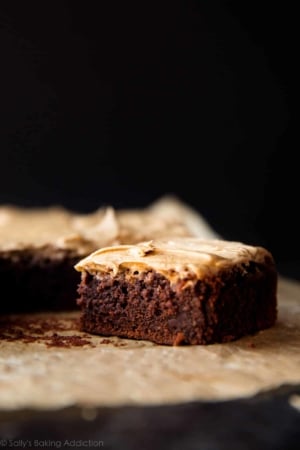
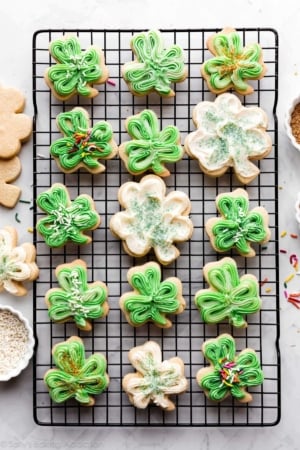
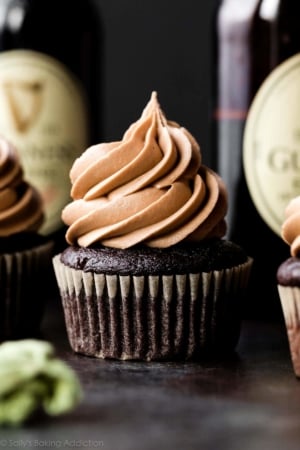


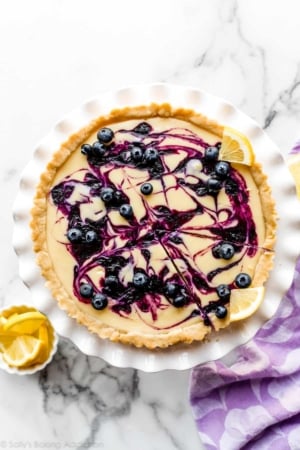
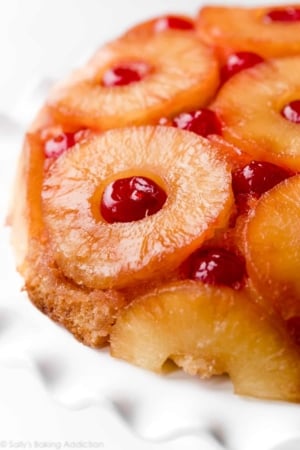
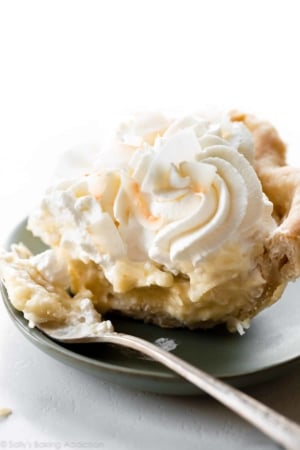
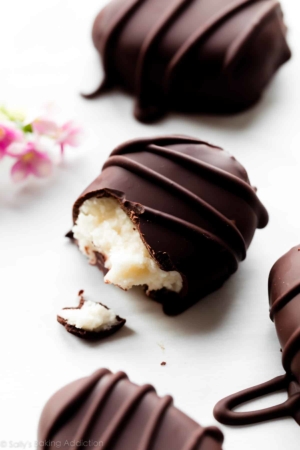
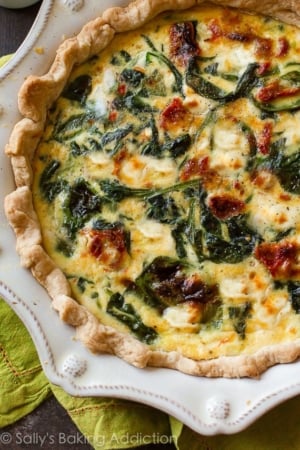
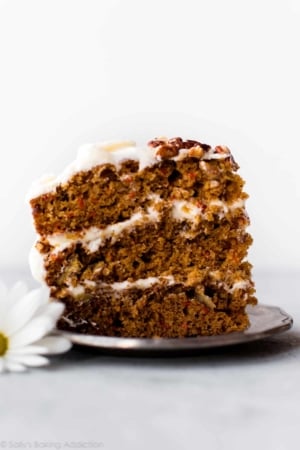






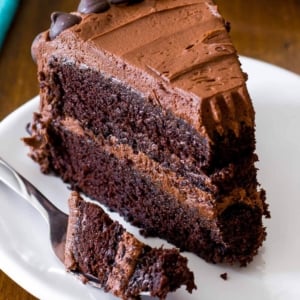

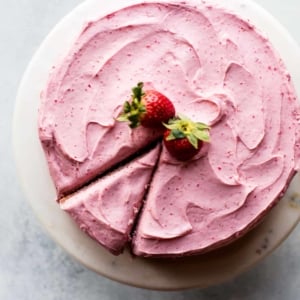
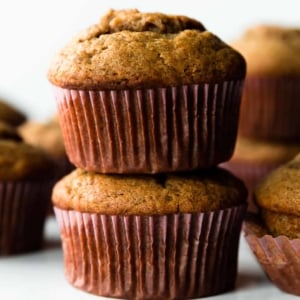
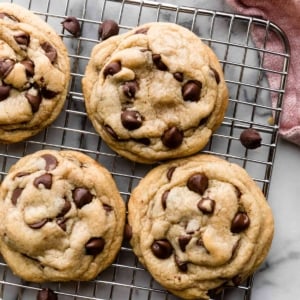
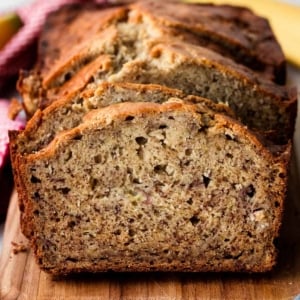
Hello! I am planning to make this on Monday, and was just wondering if it would be okay to sub espresso powder with a shot of espresso, and maybe reduce the volume of the buttermilk a little so the mixture isn’t too wet? Thank you so much in advance!
Hi Anisa, we don’t recommend using liquid espresso instead. You can simply leave out the espresso powder if you don’t have any on hand. Hope you enjoy the cake!
This recipe was great!! We had a late St Patrick’s dinner & everyone loved your cake recipe!! I made a 4-layer 6-inch cake& used the frosting 3/4’s the way up & then used the mocha-guinness buttercream from your cupcake recipe on the very top part so it looked like a “glass” of beer w the foam on top. Then printed out the Guinness label for the front of the cake. Wish I knew how to share a pic…
This may be the best chocolate cake I’ve ever had. Made like directed.did take longer to cook down beer. Made it for a st paddy party and it was a super hit. A lot of second helpings! Fantastic frosting too.